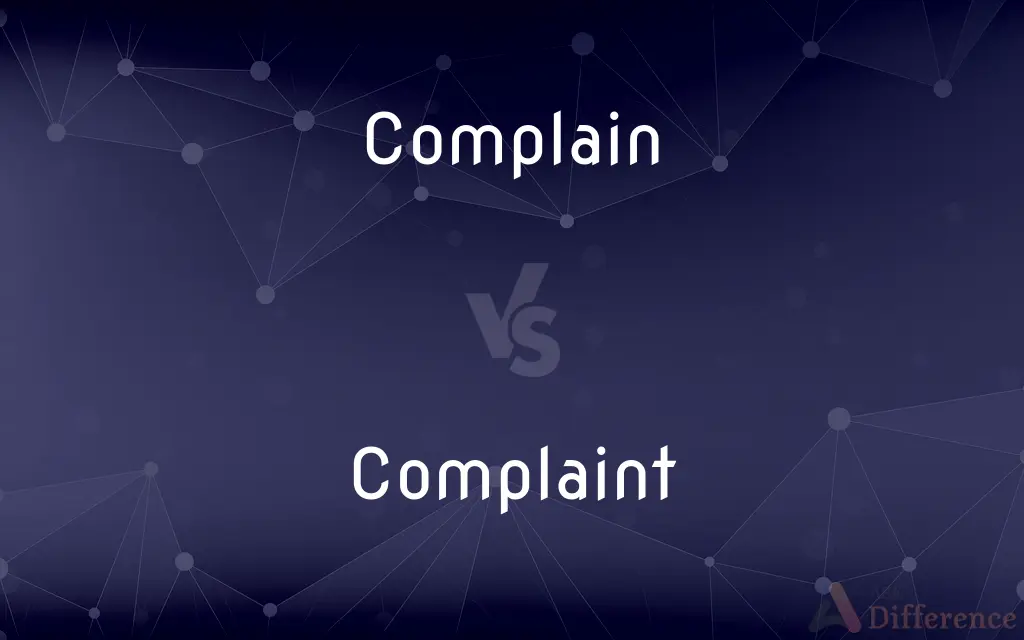Complain vs. Complaint — What's the Difference?
By Tayyaba Rehman — Updated on September 18, 2023
"Complain" is a verb that refers to the act of expressing dissatisfaction or annoyance. "Complaint" is a noun that signifies the expression itself or the issue being complained about. Essentially, you "complain" about something, generating a "complaint."

Difference Between Complain and Complaint
Table of Contents
ADVERTISEMENT
Key Differences
"Complain" is a verb used to describe the action of expressing dissatisfaction, unhappiness, or concern about something. It is the act of voicing your displeasure. "Complaint," on the other hand, is the noun form that refers to the specific grievance, concern, or issue that is being complained about. While you may complain about service at a restaurant, the complaint is what you formally express, perhaps in writing or to a manager.
In the context of grammar, "complain" requires a subject and often an object or a complement. You may complain to someone (indirect object) about something (direct object). For instance, "I complained to the manager about the service." In contrast, "complaint" can stand alone as a subject or an object. It could be the subject of a sentence, like "The complaint was not addressed," or an object, as in, "I filed a complaint."
It's essential to note that while you can "complain" silently or to yourself, a "complaint" often implies that the issue has been brought to someone's attention. When you complain, it might not go beyond you or your immediate circle, but a complaint generally suggests that the matter has been raised for resolution.
Lastly, "complain" can be used in various tenses to describe the ongoing or completed act of expressing dissatisfaction: "She complains often," "He complained yesterday," "They will complain tomorrow." "Complaint" remains constant in its noun form but can be modified using adjectives like "formal," "written," or "verbal" to provide context: "I have a formal complaint," "They received a written complaint."
Comparison Chart
Part of Speech
Verb
Noun
ADVERTISEMENT
Subject Required
Yes
Can stand alone
Object/Complement
Often required
Not required
Implies Action
Yes
No, refers to the expression
Tense Variation
Can be modified with tenses
Noun form remains constant
Compare with Definitions
Complain
To grumble or protest about something.
Children often complain when they are tired.
Complaint
A formal expression of grievance.
She filed a complaint with Human Resources.
Complain
To make a formal accusation or expression of unhappiness.
He complained to the authorities about the noise.
Complaint
A written or spoken expression of unhappiness.
They received several written complaints about the food.
Complain
To voice displeasure or unhappiness.
Customers complained about the poor service.
Complaint
An ailment or medical condition.
His chief complaint was a persistent cough.
Complain
To express dissatisfaction or annoyance.
She always complains about the weather.
Complaint
A specific issue or problem that prompts the act of complaining.
My complaint is that the room is too cold.
Complain
To articulate concerns in hopes of resolving them.
The employee complained about unsafe working conditions.
Complaint
In legal terminology, a complaint is any formal legal document that sets out the facts and legal reasons (see: cause of action) that the filing party or parties (the plaintiff(s)) believes are sufficient to support a claim against the party or parties against whom the claim is brought (the defendant(s)) that entitles the plaintiff(s) to a remedy (either money damages or injunctive relief). For example, the Federal Rules of Civil Procedure (FRCP) that govern civil litigation in United States courts provide that a civil action is commenced with the filing or service of a pleading called a complaint.
Complain
To express feelings of pain, dissatisfaction, or resentment.
Complaint
An expression of pain, dissatisfaction, or resentment.
Complain
To make a formal accusation or bring a formal charge; file a complaint.
Complaint
A cause or reason for complaining; a grievance
What is your complaint?.
Complain
(intransitive) To express feelings of pain, dissatisfaction, or resentment.
Joe was always complaining about the noise made by his neighbours.
Complaint
A bodily disorder or disease; a malady or ailment.
Complain
(intransitive) To make a formal accusation or bring a formal charge.
They've complained about me to the police again.
Complaint
The symptom or distress about which a patient seeks medical assistance.
Complain
To creak or squeak, as a timber or wheel.
The complaining bed-springs
Complaint
A formal statement initiating a lawsuit by specifying the facts and legal grounds for the relief sought.
Complain
To give utterance to expression of grief, pain, censure, regret. etc.; to lament; to murmur; to find fault; - commonly used with of. Also, to creak or squeak, as a timber or wheel.
O loss of sight, of thee I most complain!
Complaint
A formal charge, made under oath, of the commission of a crime or other such offense.
Complain
To make a formal accusation; to make a charge.
Now, Master Shallow, you'll complain of me to the king?
Complaint
The act of complaining.
Complain
To lament; to bewail.
They might the grievance inwardly complain.
By chaste Lucrece's soul that late complain'dHer wrongs to us.
Complaint
A grievance, problem, difficulty, or concern.
I have no complaints about the quality of his work, but I don't enjoy his company.
Complain
Express complaints, discontent, displeasure, or unhappiness;
My mother complains all day
She has a lot to kick about
Complaint
(legal) In a civil action, the first pleading of the plaintiff setting out the facts on which the claim is based;
The purpose is to give notice to the adversary of the nature and basis of the claim asserted.
The purpose is to give notice to the adversary of the nature and basis of the claim asserted.
Complain
Make a formal accusation; bring a formal charge;
The plaintiff's lawyer complained that he defendant had physically abused his client
Complaint
(legal) In criminal law, the preliminary charge or accusation made by one person against another to the appropriate court or officer, usually a magistrate.
However, court proceedings, such as a trial, cannot be instituted until an indictment or information has been handed down against the defendant.
However, court proceedings, such as a trial, cannot be instituted until an indictment or information has been handed down against the defendant.
Complaint
A bodily disorder or disease; the symptom of such a disorder.
Don't come too close; I've got this nasty complaint.
Complaint
Expression of grief, regret, pain, censure, or resentment; lamentation; murmuring; accusation; fault-finding.
I poured out my complaint before him.
Grievous complaints of you.
Complaint
Cause or subject of complaint or murmuring.
The poverty of the clergy in England hath been the complaint of all who wish well to the church.
Complaint
An ailment or disease of the body.
One in a complaint of his bowels.
Complaint
A formal allegation or charge against a party made or presented to the appropriate court or officer, as for a wrong done or a crime committed (in the latter case, generally under oath); an information; accusation; the initial bill in proceedings in equity.
Complaint
An often persistent bodily disorder or disease; a cause for complaining
Complaint
(formerly) a loud cry (or repeated cries) of pain or rage or sorrow
Complaint
An expression of grievance or resentment
Complaint
(civil law) the first pleading of the plaintiff setting out the facts on which the claim for relief is based
Complaint
(criminal law) a pleading describing some wrong or offense;
He was arrested on a charge of larceny
Complaint
The act of expressing dissatisfaction or annoyance.
His main complaint was about the lack of cleanliness.
Common Curiosities
Can Complain be used without an object?
Yes, you can say, "He complains a lot," without specifying what he complains about.
What does Complaint mean?
"Complaint" is a noun that refers to the expression of dissatisfaction or the issue itself.
Is a Complaint always written?
No, complaints can be verbal or written.
Can you give an example of using Complain and Complaint in a sentence?
"I complained about the service, so they asked me to file a formal complaint."
Can you have multiple Complaints?
Yes, you can have more than one issue or grievance.
What does Complain mean?
"Complain" is a verb that refers to the act of expressing dissatisfaction.
Does Complaint always need to be expressed to someone?
Generally, a "complaint" implies that the issue has been raised for attention.
Is Complain always negative?
Generally, yes; it usually signifies displeasure or dissatisfaction.
How is Complain used in legal contexts?
It can refer to a formal accusation or charge against someone.
Can you Complain on behalf of someone else?
Yes, you can express dissatisfaction for another person or entity.
Is it possible to Complain without having a legitimate Complaint?
Yes, people can complain without a valid or reasonable complaint.
How is Complaint used in medical contexts?
It refers to a specific ailment or condition a patient reports.
Does Complaint change forms like Complain does?
No, "complaint" is a noun and remains constant but can be modified with adjectives.
Can companies have a 'Complaints Department'?
Yes, many companies have a specific department to handle customer complaints.
Can Complain be used in different tenses?
Yes, like any verb, it can be modified to fit the tense of the sentence.
Share Your Discovery

Previous Comparison
Metric vs. Matrix
Next Comparison
Ladybird vs. LadybugAuthor Spotlight
Written by
Tayyaba RehmanTayyaba Rehman is a distinguished writer, currently serving as a primary contributor to askdifference.com. As a researcher in semantics and etymology, Tayyaba's passion for the complexity of languages and their distinctions has found a perfect home on the platform. Tayyaba delves into the intricacies of language, distinguishing between commonly confused words and phrases, thereby providing clarity for readers worldwide.















































